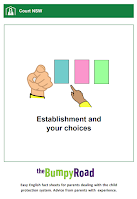Day 2 of the ASID conference offered 2 presentations in the keynote session about Easy Read.
First up Dr Deborah Chinn presented her findings and thoughts about Easy Read in the UK.
The
presentation identified that some of the Easy Read documents reviewed in the
health topics in the UK were very directive and often did not offer choice and
power to the reader. This was identified as an issue and raised the question
about the purpose of the Easy Read documents. Deborah observed that some documents may
have been designed to make the experience easier for staff, rather
than assist the reader to make decisions.
This
is an important point. Human rights legislation upholds the right of people
with disabilities to plan and make decisions about their own lives. There is an
emphasis on supported decision making rather than substitute decision making
(where others make a considered decision on behalf of another person).
I reflected on this point and our use of Easy English in Australia. Easy English (and Easy Read) can be used to give information, but can it also used to describe choices and options.
Easy English can be designed for any type of
document.
One
obvious application is an Easy English version of a goal planning document.
This should be all about choice – choose what you want to do, choose what help
you want, choose who, when and where.
Contracts
and agreements may offer choices of who to share information with, how a person
would like to receive information. When we do consent for research in Easy English, it is important to include statements about
- why the research is being done
- where the information will go
- who gets to see your personal information
- can you stop being part of the research.
There are yes/no questions about each of these key statements. Is this providing choice and power to the reader?
Look
at these examples of Easy English to see how choice is included and described:
Establishment and your choices – this describes part of the court process in Child Protection. It offers and explains choices available to parents.
(Note: Establishment is a Court word that had to be part of this title)
You are pregnant. What can you do? – a WWDA fact sheet. Explains all choices available to women who are pregnant.
Rachel Tozer
Access Easy English
Telephone: 0466 579 855
Email: rachel@accesseasyenglish.com.au
Website: https://accesseasyenglish.com.au/
Facebook: https://www.facebook.com/accesseasyenglish
Blog: http://accesseasyenglish.blogspot.com.au
Twitter: @accesseasyengli
LinkedIn Cathy Basterfield


No comments:
Post a Comment